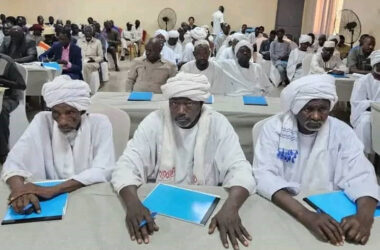By Yiep Joseph
Fresh confusion has emerged in the Abyei Administrative Area as residents express conflicting views on achieving stability amid the ongoing Sudan-South Sudan dispute over the area.
Recently, Dr. Francis Mading, a prominent scholar and Abyei citizen, reiterated his proposal for self-rule for the people of Abyei until the disputes between South Sudan and Sudan are resolved.
In a letter to the media, Dr. Francis argued that self-rule could foster stability and enhance development in the area.
He suggested that the African Union, United Nations, and other stakeholders, currently focused on mediating the conflict between Sudanese factions, should prioritize resolving Abyei’s final status.
However, a position letter dated November 12 and signed by Deng Alor Kuol, Minister of East Africa Affairs, and Ambassador Dr. Chol Deng Alak, Chief Administrator of the Abyei Special Administrative Area, along with other local leaders, denounced Dr. Francis’s proposal as a divisive plan.
The letter, addressed to South Sudan President Salva Kiir and shared with political parties, the AU, the Foreign Affairs Ministry, and UN Security, called on stakeholders to urgently resolve the issue of Abyei’s final status.
“We urge our government to intensify efforts to engage the African Union, the United Nations, and the international community at large to expedite a resolution to Abyei’s final status, inter alia, recognition of the results of the Ngok Dinka Community referendum of 2013 or holding of a new referendum based on the African Union Mbeki proposal of September 21, 2012,” it added.
The people of Abyei expressed that Dr. Francis Mading failed to put into consideration the close relationship between the people of Abyei and South Sudan.
They expressed that the community consensus for self-ruling, as stated in Dr. Francis Mading Deng’s assertion, remains baseless, citing that the idea is supported by a small number of people with an agenda of division.
“Dr. Francis Mading Deng’s divisive proposal represents an insignificant minority view that does not reflect the true desires of the Ngok Dinka of Abyei people,” the statement read.
“The Ngok Dinka people of Abyei remain steadfast in their resolve to remain an integral part of South Sudan,” it added.
The group stated that while Dr. Francis Mading Deng presented his intentions as attempts to secure peace, stability, and self-determination for the people of Abyei, it failed to consider the well-being and aspirations of the Ngok Dinka people.
“This proposal, therefore, attempts to undermine Abyei’s historical and cultural ties to South Sudan and disregards the hard-fought progress and gains made in recent years to integrate Abyei into its rightful place within the fabric of the South Sudanese nation.” It added.
The group expressed that the current violence cannot be blamed on the South Sudan government, citing that the South Sudan government has tried its best to provide security and service to the people of Abyei.
“Dr. Francis Mading Deng’s claim that South Sudan has neglected Abyei or failed to provide adequate services to its people is fundamentally false. Since establishing the Abyei Special Administrative Area (ASAA), South Sudan has made substantial efforts to support the welfare of the Abyei people through budgetary allocations similar to those it provides to any other state governments in the country,” the statement read.
in October 27th, leaders of the Dinka Ngok in Abyei demanded self-governance as the ongoing conflict in Sudan dashed hopes for a referendum to determine the disputed region’s future.
The chiefs from Nine Dinka Ngok chiefdoms presented a memorandum to the United Nations Interim Security Force for Abyei (UNISFA) demanding autonomy for the Abyei region.
However, the administrative Area government condemned the protest by local chiefs demanding self-governance, arguing that such a demand could heighten insecurity and division in the area.
Dr. Francis Mading initially suggested self-rule for Abyei two years ago in response to hostilities with the neighboring communities.
Following the independence of South Sudan from Sudan in 2011, Abyei was left as a disputed area as no side wanted to give the rich oilfields in the region.
Although given special administrative area status as per the 2004 Compressive Peace Agreement (CPA), both South Sudan and Sudan claimed ownership of the area; however, the current war in Sudan dashed some of the existing hope of resolving the dispute sooner.




